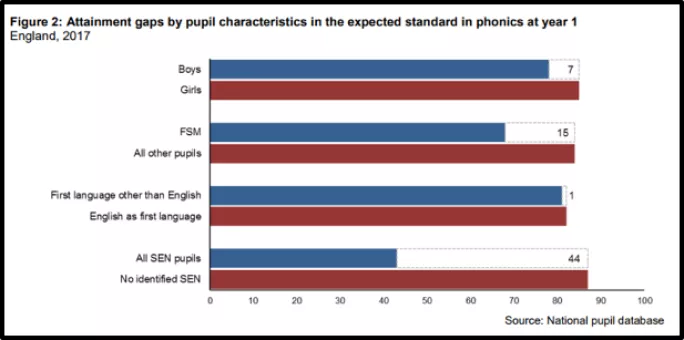I’ve got four daughters between the age of 4 and 11, and it was with mixed emotions that I took the youngest, Charlotte, to start her Reception year a couple of weeks back.
It was the first time I’d been able to do the drop-off for a first day. All I could think about as we walked to school was that we’d no longer have any preschool-aged kids in the house, and whether she would adjust OK to full-time schooling. All she wanted to know was what times snack and lunch were. Having deposited her lunchbox in the designated place, she found her coat peg and her drawer, and couldn’t get rid of me quick enough. I went home, had a strong coffee and maybe shed a tear or two.
I’ve seen her three older sisters go through Reception, and it is a truly magical time. It made such an impact on our family - most markedly in the way that their amazing teachers transformed our tiny children into enthusiastic, confident, beginner readers. Don’t get me wrong, listening to Tim and Tam for the umpteenth time led to some moments of quiet existential despair, but for my girls, becoming readers was an important stage in becoming more of their own person. I can’t wait for that magical day soon when Charlotte comes home with a book to read with us.
There are many important things we ask of our early years and key stage 1 colleagues. Among everything else, they have to find ways to get young children, who are full of energy and a desire to talk about whatever is in their heads, to sit down and get cracking on phonics and reading. The chart below, from today’s publication of phonics and KS1 assessment data, gives some idea of the incredible leaps made in recent years thanks to everyone’s hard work:
Hundreds of thousands more children have been taught the basic knowledge needed to get going with their reading - and this year, 92 per cent of kids had reached the expected standard in their phonics by the end of Year 2. This is something we should be really proud of as a country.
That said, we can’t ignore a definite plateauing in recent years, at around 80 per cent hitting the mark by the end of Year 1 and 90 per cent by Year 2. I was also taken aback by this chart, which looked at gaps in the proportion of different groups of children achieving the standard:
Just look at the gap between children on free school meals and others: it’s massive, and it’s barely changed in recent years either. It’s got me thinking hard about what else the brilliant people who work with our 3, 4 and 5-year olds could do, to try and get us nearer everyone’s goal of every child mastering phonics as soon as possible.
Recently, I’ve spent quite a bit of time talking to schools that are getting all or nearly all of their children to the expected standard in phonics in Year 1. Across a variety of contexts, intakes, and areas, I have been struck by the similarity in the approach they have all taken.
Most significantly, they don’t wait until Reception to get going on phonics, but start most kids in their pre-Reception year - when they judge that they’re ready for, and will benefit from, it. (For most this was the latter part of the autumn term, once they’d settled into routines.) It wasn’t about formal lessons: the bulk of a child’s time is still structured or free play, but they carve out several short slots a day for structured but informal sessions.
Everyone I spoke to mentioned how quickly three-year-olds could pick up the building blocks and apply them, and, unprompted, said that they felt it was the only way to ensure groups of kids didn’t fall behind early on.
This isn’t something that can be done only in well-off areas, or requires extra funding or resources: all it requires is a tweaking of approach and high expectations for all students. Some of the people I spoke to have really disadvantaged intakes, or have had historically low funding, and still get brilliant phonics results. It doesn’t have to stress anyone, and it won’t take away any innocence or happiness from the child. It just ensures that they get a head-start on this vital skill, and prevents setting them on the path to being behind for their whole school career, which is sadly what happens to so many that struggle in their first few years of schooling.
With a review of the EYFS Early Learning Goals about to happen, we have a great opportunity to incorporate into these the things we’ve learned about effective phonics teaching on very young children. Strengthening early literacy is key if we’re going to raise further the proportion of kids hitting the mark in Year 1, narrow the word gap, and enable every single kid to get from Tim and Tam to Mrs Tiggywinkle as soon as possible.
Mark Lehain is director of Parents and Teachers for Excellence and the founder of Bedford Free School
Want to keep up with the latest education news and opinion? Follow Tes on Twitter and like Tes on Facebook





